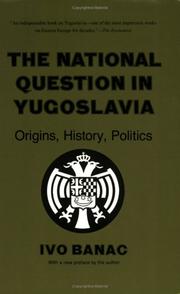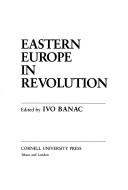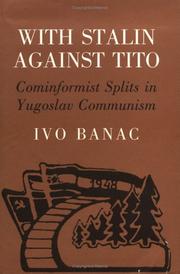| Listing 1 - 10 of 21 | << page >> |
Sort by
|

ISBN: 0801494931 Year: 1988 Publisher: Ithaca Cornell University Press
Abstract | Keywords | Export | Availability | Bookmark
 Loading...
Loading...Choose an application
- Reference Manager
- EndNote
- RefWorks (Direct export to RefWorks)

ISBN: 0801499976 0801427118 150173332X Year: 1992 Publisher: Ithaca ; London Cornell University Press
Abstract | Keywords | Export | Availability | Bookmark
 Loading...
Loading...Choose an application
- Reference Manager
- EndNote
- RefWorks (Direct export to RefWorks)
321 <4-11> --- #SBIB:328H27 --- #SBIB:003.IEB --- 321 <4-11> Politieke organisatie. Staten als politieke machten. Regeringsvormen--Oost-Europa --- Politieke organisatie. Staten als politieke machten. Regeringsvormen--Oost-Europa --- Instellingen en beleid: Midden- en Centraal Europa: algemeen --- Europe, Eastern --- Politics and government

ISBN: 0801416752 1501701940 0801494931 1501701932 Year: 1984 Publisher: Cornell University Press
Abstract | Keywords | Export | Availability | Bookmark
 Loading...
Loading...Choose an application
- Reference Manager
- EndNote
- RefWorks (Direct export to RefWorks)
Even before it collapsed into civil war, ethnic cleansing, and dissolution, Yugoslavia was an archetypical example of a troubled multinational mosaic, a state without a single national base or even a majority. Its stability and very existence were challenged repeatedly by the tension between the pressures for overarching political cohesion and the defense of separate national identities and aspirations.In a brilliant analysis of this complex and sensitive national question, Ivo Banac provides a comprehensive introduction to Yugoslav political history. His book is a genetic study of the ideas, circumstances, and events that shaped the pattern of relations among the nationalities of Yugoslavia. It traces and analyzes the history and characteristics of South Slavic national ideologies, connects these trends with Yugoslavia's flawed unification in 1918, and ends with the fatal adoption of the centralist system in 1921. Banac focuses on the first two and a half years in the history of the Kingdom of the Serbs, Croats, and Slovenes, because in his view this was the period that set the pattern for subsequent development of the national question. The issues that divided the South Slavs, and that still divide them today, took on definite form during that time, he maintains. Banac provides extensive treatment of all of Yugoslavia's nationalities; his sections on the Montenegrins, Albanians, Macedonians, and Bosnian Muslims are unique in the literature. In this unbiased account, all of the principals and groups assume a tragic fascination.When published in 1984, The National Question in Yugoslavia was the first complete introduction to the cultural history of the South Slavic peoples and to the politics of Yugoslavia, and it remains a major contribution to the scholarship on modern European nationalism and the stability of multinational states.
Book
Year: 1983 Publisher: [Boulder] East Europe monographs
Abstract | Keywords | Export | Availability | Bookmark
 Loading...
Loading...Choose an application
- Reference Manager
- EndNote
- RefWorks (Direct export to RefWorks)
Book
ISBN: 9781501701948 Year: 1988 Publisher: Ithaca, NY
Abstract | Keywords | Export | Availability | Bookmark
 Loading...
Loading...Choose an application
- Reference Manager
- EndNote
- RefWorks (Direct export to RefWorks)
Book
ISBN: 9781501720833 Year: 2018 Publisher: Ithaca, NY
Abstract | Keywords | Export | Availability | Bookmark
 Loading...
Loading...Choose an application
- Reference Manager
- EndNote
- RefWorks (Direct export to RefWorks)

ISBN: 0801421861 150172083X Year: 2018 Publisher: Cornell University Press
Abstract | Keywords | Export | Availability | Bookmark
 Loading...
Loading...Choose an application
- Reference Manager
- EndNote
- RefWorks (Direct export to RefWorks)

ISBN: 1281722618 9786611722616 0300133855 9780300133851 0300097948 9780300097948 9781281722614 6611722610 Year: 2003 Publisher: New Haven Yale University Press
Abstract | Keywords | Export | Availability | Bookmark
 Loading...
Loading...Choose an application
- Reference Manager
- EndNote
- RefWorks (Direct export to RefWorks)
Georgi Dimitrov (1882-1949) was a high-ranking Bulgarian and Soviet official, one of the most prominent leaders of the international Communist movement and a trusted member of Stalin's inner circle. Accused by the Nazis of setting the Reichstag fire in 1933, he successfully defended himself at the Leipzig Trial and thereby became an international symbol of resistance to Nazism. Stalin appointed him head of the Communist International (Comintern) in 1935, and he held this position until the Comintern's dissolution in 1943. After the end of the Second World War, Dimitrov returned to Bulgaria and became its first Communist premier. During the years between 1933 and his death in 1949, Dimitrov kept a diary that described his tumultuous career and revealed much about the inner working of the international Communist organizations, the opinions and actions of the Soviet leadership, and the Soviet Union's role in shaping the postwar Eastern Europe. This important document, edited and introduced by renowned historian Ivo Banac, is now available for the first time in English. It is an essential source for information about international Communism, Stalin and Soviet policy, and the origins of the Cold War.
Statesmen --- Communists --- Communism --- Public officers --- Dimitrov, Georgi, --- Dimitrov, Georgiĭ, --- Dimitroff, Georgi, --- Dimitrov, Georges, --- Dimitrov, Giorgio, --- Dimitrov, Jiří, --- Dimitrov, Jorge, --- Dimitrow, Georgi, --- Dymytrov, Heorhiĭ, --- Dzimitrov, Heorhiĭ, --- Dīmītrūf, Ghiyūrghī, --- Deimitorofu, G., --- Dimitorofu, --- Димитров, Георги, --- דימיטראָװ, געאָרגי --- דימיטראוו, ג. --- דימיטראװ, ג. --- 季米特洛夫, --- Bulgaria --- History --- Persons
Book
ISBN: 0936586028 Year: 1983 Publisher: New Haven (Conn.) : Yale concilium on international and area studies,
Abstract | Keywords | Export | Availability | Bookmark
 Loading...
Loading...Choose an application
- Reference Manager
- EndNote
- RefWorks (Direct export to RefWorks)
Book
ISBN: 0936586133 Year: 1995 Publisher: New Haven (Conn.) : Yale center for international and area studies,
Abstract | Keywords | Export | Availability | Bookmark
 Loading...
Loading...Choose an application
- Reference Manager
- EndNote
- RefWorks (Direct export to RefWorks)
National characteristics, East European --- Nationalism --- Congresses. --- Congresses
| Listing 1 - 10 of 21 | << page >> |
Sort by
|

 Search
Search Feedback
Feedback About UniCat
About UniCat  Help
Help News
News